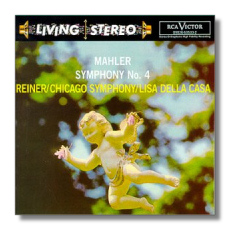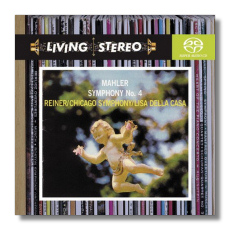
The Internet's Premier Classical Music Source
Related Links
- Mahler Reviews
- Latest Reviews
- More Reviews
-
By Composer
-
Collections
DVD & Blu-ray
Books
Concert Reviews
Articles/Interviews
Software
Audio
Search Amazon
Recommended Links
Site News
 CD Review
CD Review
Gustav Mahler

Symphony #4 in G Major
Lisa Della Casa, soprano
Chicago Symphony Orchestra/Fritz Reiner
RCA Victor Living Stereo 09026-63533-2 ADD 53:44
Also released on Hybrid Multichannel SACD 82876-67901-2:
Amazon
- UK
- Germany
- Canada
- France
- Japan
- ArkivMusic
- CD Universe
Back in 1958, when this recording was made, Mahler's greatness as a composer was not the foregone conclusion that it is today. Fritz Reiner himself had gone on a figurative voyage of discovery before realizing that this was music worth conducting and recording. He made two Mahler LPs with the Chicago Symphony Orchestra: this, and Das Lied von der Erde (which seems not to be available on CD at this time). Both have stood the test of time well, although they're not definitive. No single Mahler recording could be.
Reiner moves right along; this is one of the fastest Mahler Fourths. Bernstein's first recording of this work plays for 55:02, and his Concertgebouw remake plays for 57:07. Sinopoli is even slower, at 58:03, and Maazel takes a leisurely 60:56. Reiner plays the first movement very Classically and without parody, as if he were looking back at Haydn and early Beethoven. The incipient threat in second movement is not emphasized; even the scordatura violin effects are subtle. The recording reaches its highlight in the third movement, which coaxes a genial (if not entirely relaxed) mood out of the conductor. Two obvious edits near the end of the movement are a bit jarring over headphones. The finale goes well. Lisa Della Casa has a conventionally attractive tone. Fortunately, she is neither cloying nor knowing in the Wunderhorn song, but she isn't particularly boyish either. Overall, this is a Fourth characterized by its careful preparation and sane objectivity. The orchestra is well drilled. This is Mahler at his most normal. It would be a good complement for any of the more personal versions mentioned above, and especially for Mengelberg's, which is worth hunting down. Boulez's new recording, to be reviewed here shortly, has much in common with Reiner's.
The 20-bit remastering helps to realize a burnished sound with enjoyable warmth and presence.
Copyright © 2000, Raymond Tuttle




















